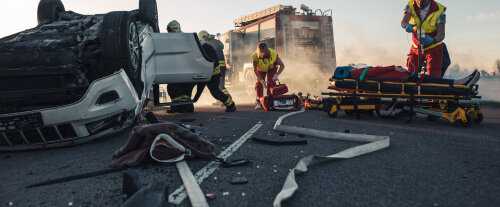Best Toxic Tort Lawyers in Switzerland
Share your needs with us, get contacted by law firms.
Free. Takes 2 min.
Or refine your search by selecting a city:
List of the best lawyers in Switzerland
About Toxic Tort Law in Switzerland
Toxic Tort law in Switzerland deals with cases where individuals have suffered harm due to exposure to toxic substances. These cases can involve environmental pollution, occupational exposure, or contaminated products. Seeking legal guidance in such cases is essential to ensure that victims receive compensation for their injuries.
Why You May Need a Lawyer
You may need a lawyer in Toxic Tort cases if you have been exposed to a toxic substance and suffered harm as a result. Lawyers can help you navigate the legal process, gather evidence, and negotiate with responsible parties to secure compensation for your injuries.
Local Laws Overview
In Switzerland, Toxic Tort cases are regulated by various laws, including the Swiss Code of Obligations and the Swiss Environmental Protection Act. These laws impose strict liability on polluters and manufacturers of toxic substances, making it easier for victims to seek compensation for their injuries.
Frequently Asked Questions
1. What is considered a toxic tort in Switzerland?
In Switzerland, a toxic tort refers to a legal claim brought by an individual who has been harmed by exposure to a toxic substance.
2. How long do I have to file a toxic tort claim in Switzerland?
The statute of limitations for toxic tort claims in Switzerland is generally ten years from the date of exposure.
3. What kind of compensation can I receive in a toxic tort case in Switzerland?
Victims of toxic torts in Switzerland can seek compensation for medical expenses, lost wages, pain and suffering, and punitive damages.
4. Who can be held liable in a toxic tort case in Switzerland?
Liability in toxic tort cases in Switzerland can extend to polluters, manufacturers, distributors, and other parties responsible for the exposure to toxic substances.
5. What evidence is needed to prove a toxic tort case in Switzerland?
To prove a toxic tort case in Switzerland, you will need to provide medical records, expert testimony, witness statements, and other evidence linking your injuries to the toxic exposure.
6. Can I file a toxic tort claim on behalf of a deceased loved one in Switzerland?
Yes, family members of a deceased victim can file a toxic tort claim on their behalf in Switzerland.
7. Will my toxic tort case go to trial in Switzerland?
Many toxic tort cases in Switzerland are settled out of court, but if a settlement cannot be reached, the case may proceed to trial.
8. Can I afford to hire a lawyer for my toxic tort case in Switzerland?
Many lawyers in Switzerland offer free consultations and work on a contingency fee basis, meaning you only pay if you win your case.
9. Can I sue for punitive damages in a toxic tort case in Switzerland?
Yes, victims of toxic torts in Switzerland can sue for punitive damages to punish wrongdoers and deter future misconduct.
10. How long does it take to resolve a toxic tort case in Switzerland?
The timeline for resolving a toxic tort case in Switzerland varies depending on the complexity of the case, but most cases are resolved within a few years.
Additional Resources
For more information on Toxic Tort law in Switzerland, you can contact the Swiss Environmental Agency or consult with a local law firm specializing in environmental law.
Next Steps
If you believe you have a potential Toxic Tort case in Switzerland, it is important to consult with a qualified lawyer who has experience in handling such cases. They can evaluate your claim, explain your legal rights, and guide you through the legal process to ensure that you receive fair compensation for your injuries.
Lawzana helps you find the best lawyers and law firms in Switzerland through a curated and pre-screened list of qualified legal professionals. Our platform offers rankings and detailed profiles of attorneys and law firms, allowing you to compare based on practice areas, including Toxic Tort, experience, and client feedback.
Each profile includes a description of the firm's areas of practice, client reviews, team members and partners, year of establishment, spoken languages, office locations, contact information, social media presence, and any published articles or resources. Most firms on our platform speak English and are experienced in both local and international legal matters.
Get a quote from top-rated law firms in Switzerland — quickly, securely, and without unnecessary hassle.
Disclaimer:
The information provided on this page is for general informational purposes only and does not constitute legal advice. While we strive to ensure the accuracy and relevance of the content, legal information may change over time, and interpretations of the law can vary. You should always consult with a qualified legal professional for advice specific to your situation.
We disclaim all liability for actions taken or not taken based on the content of this page. If you believe any information is incorrect or outdated, please contact us, and we will review and update it where appropriate.
Browse toxic tort law firms by city in Switzerland
Refine your search by selecting a city.
















